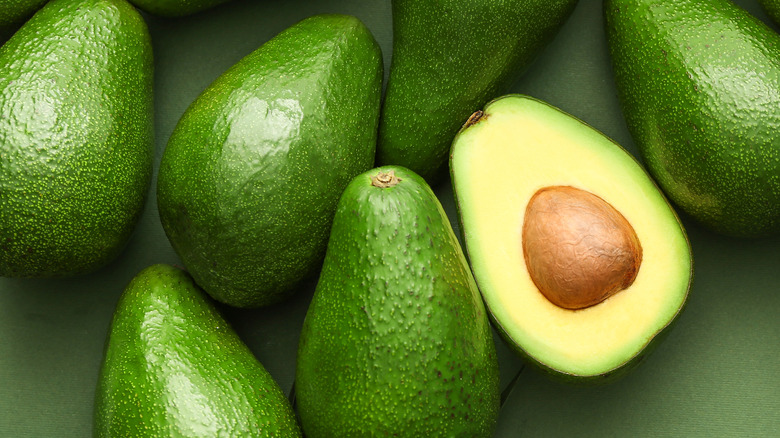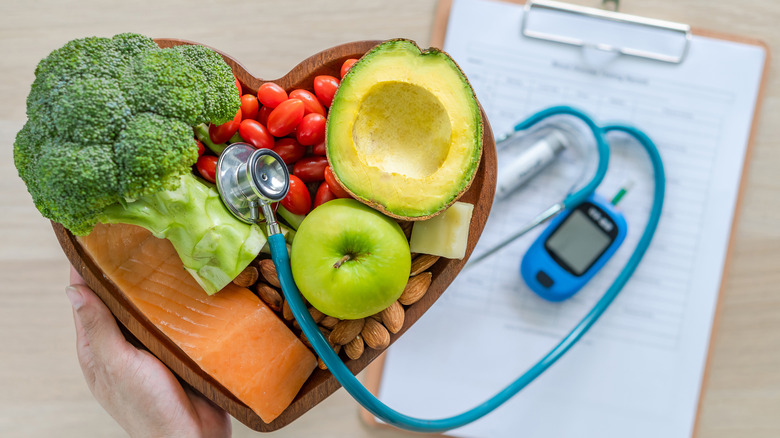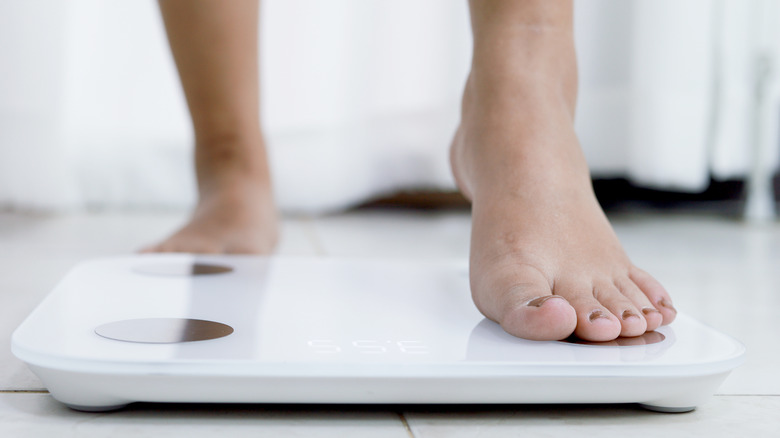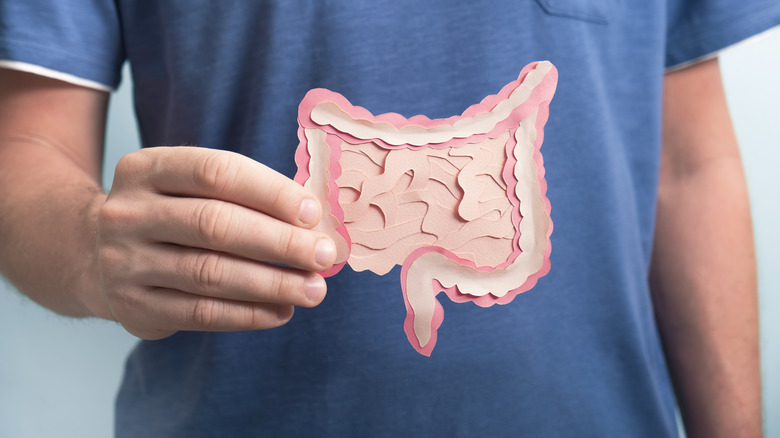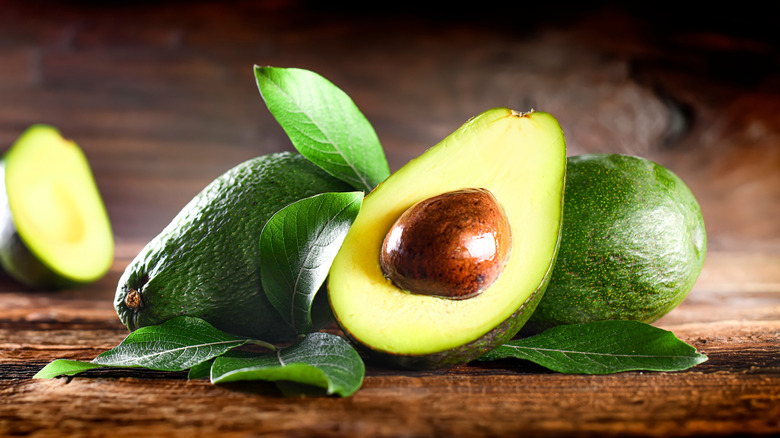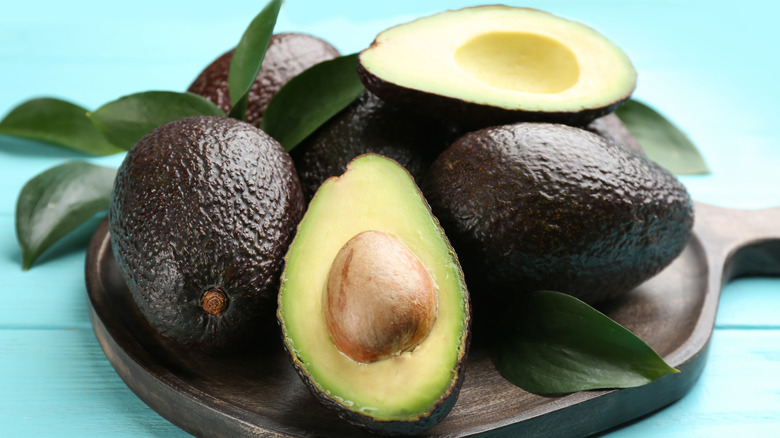When You Eat An Avocado Every Day, This Is What Happens To You
It's green, but it's definitely not mean — the humble avocado is probably one of the nicest additions you can make to your diet! Although you might think of avocado as a vegetable because of the way it's used in salads and other savory dishes, it's actually a fruit, one that fits botanically into the berry family, according to California Avocado. (That makes sense though ... after all, they do have a pit right in the middle). But what's really impressive about avocados is not just their botanical distinction or how delicious they are. Avocados are incredibly healthy for you, offering a variety of vitamins and minerals with health benefits you may never have considered before (via Taste). If you're somebody who can't get enough avocado, you now have a great excuse to make them part of your daily diet. Interested in learning the specifics? Here's what you can expect to happen to you when you eat an avocado every day.
You can keep your cholesterol in check
When people talk about the fat content in avocados, they'll usually refer to it as what's colloquially known as "good fat." But what does "good fat" even mean? Healthcare organization Cedars-Sinai explains that good fats usually encompass monounsaturated fats and polyunsaturated fats, which avocados are a source of. When you eat these monounsaturated and polyunsaturated fats, your body is able to lower the amount of LDL, or low-density lipoproteins, in your blood. This helps maintain healthy cholesterol levels or even lower cholesterol levels for people whose numbers might be higher than ideal.
In fact, a study released by Penn State in October 2019 looked at test subjects who were either overweight or obese and found that eating an avocado every single day as part of a diet with moderate fat content was enough to improve LDL levels compared with eating a low-fat diet or a moderate-fat diet without avocado (via Science Daily).
You'll have more physical and mental energy
Avocados offer a lot of nutrients — to name a few, you'll get folate, vitamin C, vitamin E, vitamin B12, vitamin K, niacin, folate, and antioxidants when you eat a serving of avocado, according to Taste. All of those good-for-you vitamins and minerals mean that your body has what it needs to operate at peak performance. When you eat an avocado, you'll get a boost of energy and probably experience an elevated mood. This might explain why Taste encourages eating an avocado in the morning (and potentially in place of a cup of coffee) if you want to put avocado's energy boosting qualities to the test.
But it's not just the nutrients that avocado contains by itself. Taste goes on to explain that eating an avocado helps you get even more benefits from other foods. This is because of the fat content in avocado. All of that heart-healthy fat means fat-soluble nutrients in your body have a chance to be absorbed. When avocado is paired with colorful produce like what you'd typically find in a salad, it's a win-win for your body.
Your complexion improves
What if the fountain of youth were actually a tree — an avocado tree, to be specific? Although avocados aren't magically going to keep you young forever, they do have nutritional properties that can help you achieve the brighter, clearer complexion that so many people yearn for (and that makes them look a few years younger). Everyday Health attributes avocado's complexion-clearing abilities to its vitamin C content, as this nutrient is able to prevent skin inflammation. Additionally, vitamin C gives your body its ability to heal wounds and defend itself against dry skin (hello, moisturized complexion).
The benefits of vitamin C for your skin go even further, according to Healthline. Vitamin C is a necessary nutrient for producing a structural component known as collagen. Without collagen, your skin would not be supple and strong. Healthline also points out that avocados are a source of vitamin E, a nutrient many Americans are lacking. Vitamin E is great for your skin because it reduces oxidative damage we sustain from sun exposure — and so many of us understand how excess sun exposure leads to prematurely aged skin! It's great to know that avocados might be able to help fend against that.
Your eyes will stay sharp
That same vitamin E that's great for your skin health might benefit another body part as well: your eyes. Even though carrots get all the glory when it comes to maintaining a strong set of peepers, avocado is a great food for healthy eyesight, according to the BBC. This notion is further support by Bard Optical, which lists lutein in particular as a component found in avocados that is good for your eye health. This antioxidant helps protect your eyes from damage caused by blue light — yes, the kind that comes from your cell phone, computer, and other devices — and helps guard against cataracts and age-related macular degeneration.
The Academy of Nutrition and Dietetics points out that lutein is a fat-soluble carotenoid, so it's best to also consume fat — such as the kind found in an avocado — when you eat a source of this compound. Even if you're getting this carotenoid from another food source (the Academy recommends kale), you want to have a source of fat like avocado to make sure your body absorbs what it can.
You might lose weight
Because avocados are so smooth, creamy, and buttery — and even a little bit sweet — it might come as a surprise to find out that they could potentially be helpful for individuals who are trying to lose weight. But they are, according to Everyday Health. This once again goes back to the fat content of avocados, which can help you feel satiated and stay satisfied between meals.
Another nutritional component that's good for satiety? Fiber. And fiber is found abundantly in avocados. Everyday Health points out that a 100-gram serving of avocado contains about 7 grams of fiber, which will ensure your stomach feels full. This idea was put to the test in a small study published in Nutrition Journal in 2013, which traced a small group of overweight adults and found that those who ate an avocado at lunch reported greater feelings of satiety throughout the hours that followed. Although these results warrant further study, they do indicate promise for people who want to include avocados in their diet and still slim down.
Or you might gain weight
Even though avocados are hailed as good for weight loss, they could have the opposite effect if you don't practice moderation, as Everyday Health indicates as a downside of this fruit. It makes sense — the high fat content in avocados means that they are high in calories. And if you overeat avocados, it can be easy to bust through your recommended daily calorie intake. (This could be particularly true of anyone who assumes that because avocados are healthy, they can therefore be eaten without any kind of discretion.)
According to the USDA, one avocado (about 200 grams) has more than 300 calories. That's a lot when compared to other fruits like an apple or an orange. And if you start adding an avocado to your daily eating routine without eliminating other sources of energy elsewhere in your diet, then that's an extra 300 calories a day you're taking in — enough to make you gain weight pretty quickly!
You'll ward off disease
Did you know that avocados are a source of about 20 vitamins and minerals? Not to mention antioxidants! Health explains that all of these nutrients play important roles in a functioning body, and that includes the strong immune system you develop from a healthy amount of vitamin E.
But it's not just about the immunity you develop against short-term diseases. Avocados are important for fending off chronic conditions too. Take heart disease, for example. The cholesterol-lowering properties of avocado means that this fruit is able to help your body prevent a whole range of life-threatening conditions: heart disease, fatty liver disease, type 2 diabetes, and high blood pressure, according to the Produce for Better Health Foundation. This notion is supported by Integrative Cancer Answers, which adds that the carotenoids and antioxidants found in avocados are good for preventing the development of cancer; however, it's important to note, as Integrative Cancer Answers explains, that there's no single nutrient (or any single food, for that matter) that can protect against disease, so it's important that health-boosting avocados are consumed as part of a varied and healthy overall diet. Colorado Primary Health Care even points out that phytochemicals found in avocado are effective in stopping precancerous and cancerous cells from growing. Meanwhile, these phytochemicals can actually boost your body's production of lymphocytes, the white blood cells that serve your immune system in the fight against disease.
You'll have a healthier pregnancy
When women are undergoing pregnancy and they have a little one growing inside them, they know that good nutrition is more important than ever. After all, they have to stay healthy so that their baby is healthy. One nutrient that's especially important is folate, a type of B vitamin — and one that's found abundantly in avocados (via CNN Health). If a woman in the early stages of pregnancy is deficient in folate, this puts her baby at risk of birth defects of the brain and spine. That's why pregnant women are supposed to have about 600 micrograms of folate every day. Even if women don't know they're pregnant but they're of childbearing age, they should be getting at least 400 micrograms every day to ensure any unplanned pregnancies are healthy ones.
Fortunately, avocado is a great choice for anyone looking to increase their intake of folate. With 81 micrograms of the B vitamin per 100-gram per serving, avocados will help reduce the risk of birth defects and ensure a healthy pregnancy.
You could prevent osteoporosis
One of the big struggles of getting older is the risk of osteoporosis, a condition in which your bones lose density and are at a greater risk of breaking (via MedlinePlus). People with osteoporosis can lose much of their independence if a simple fall or bang causes a broken bone that doesn't heal. And among the nutrients that are important for strong, healthy bones is vitamin K, according to Colorado Primary Health Care. Although most people associate the mineral calcium as the necessary nutrient for bone health, vitamin K is just as important because it can boost your body's ability to absorb calcium. Sufficient vitamin K will also prevent too much calcium from being excreted via your urinary system. In other words, calcium won't do you much good if you're not getting enough vitamin K.
Colorado Primary Health Care explains that avocado is a great option for getting sufficient vitamin K and preventing osteoporosis. When you eat half an avocado, you're getting about one-quarter your vitamin K needs for the day — so if you eat a whole avocado, you could be getting half your vitamin K needs. Sounds like a good excuse to slice up the green fruit and keep your skeleton strong.
You'll satisfy your sweet tooth in a healthier way
There are some days when you just have a hankering for something sweet. Whether you want a slice of cake, a few cookies, or a cup of rich ice cream, you know that you're looking for a snack that's going to hit your taste buds in a certain way. But unfortunately, you know you have to be moderate in those dietary indulgences if you're going to maintain good health.
But here's where avocado can help you achieve balance: Because of its creamy texture and mildly sweet taste, it actually works really well in typical dessert foods, according to Health. By getting creative in the kitchen, you can find ways to substitute avocado for the butter in your favorite baked goods — and that means fewer calories and more nutrients, all without ever actually sacrificing taste. Hey, who wouldn't want to slice themselves a brownie and think, "This is a great way to enjoy a fruit — I'm doing this because I want to make sure I'm eating more avocado," right?
You'll improve your mental health
It can be tough to keep a positive outlook on life sometimes. Although there are outside factors to psychological illnesses like depression and anxiety, good nutrition can make a difference in the way you feel mentally and emotionally (via Harvard Health Publishing). For example, some nutrients will have bearing on the way your body produces and distributes the hormones in charge of certain moods and functions. Think of homocysteine, an amino acid produced in the body (via Cleveland Clinic). This is a substance that in excess amounts can interfere with your body's ability to create hormones like serotonin, dopamine, and norepinephrine, according to Colorado Primary Health Care. When homocysteine negatively affects your hormonal ability to achieve good sleep, have a good appetite, or just hold a good mood, your mental health suffers. Additionally, homocysteine stops necessary nutrients from getting to your brain, so your mental processes are impaired.
Don't worry though — the same folate in avocado that ensures a healthy pregnancy can also stop your body from storing up too much homocysteine. Therefore, you're more likely to have better mental clarity and better moods.
You'll improve your digestion
Good health starts with healthy digestion — after all, you want to make sure your body is able to break down, absorb, and properly use all the nutrients you're giving it through food (via Austin Gastroenterology). Plus, nobody is ever at their best when they're dealing with digestive problems like constipation, diarrhea, or an upset stomach.
When you eat avocados, you're setting yourself up for health digestion in two ways, according to Weight Watchers. First, avocados are a great source of fiber, which many American diets are deficient. Fiber is important because it adds bulk to your stool, ensuring that it passes smoothly through your digestive system. According to the USDA, a 100-gram serving of avocado has nearly 7 grams of fiber for healthy digestion. The other aspect of good digestion where avocado plays a role is through its support of good bacteria in your gut. Weight Watchers cites a recent study published in the Journal of Nutrition explaining that eating avocado every day results in a greater abundance and diversity of healthy bacteria in a person's stomach and intestines. These friendly bacteria are great for boosting overall health (via Healthline).
You'll lower your blood pressure
If your doctor has told you recently that your blood pressure is too high, they might have also advised you to cut back on your dietary consumption of sodium. But there's another important dietary component to managing your blood pressure: potassium. The American Heart Association explains how potassium is an important mineral for fluid balance, because it prompts your body to excrete sodium via urine. Additionally, as Harvard Health Publishing points out, potassium relaxes your muscles, including the muscles that form the walls of your blood vessels. When these blood vessels relax, your blood pressure decreases. For these reasons, a person with high blood pressure should increase their consumption of potassium.
While most American diets tend to be too high in sodium and too low in potassium, people who eat avocados regularly are less likely to run into this problem — the USDA lists that a 100-gram serving of avocado offers 10% of the potassium you need in a day. So reach for the avocado and reap the heart benefits.
You'll avoid anemia
Ever feel fatigued or cold for no explainable reason? It could be signs of anemia, a condition caused by iron deficiency (via Mayo Clinic). But even though iron is the mineral that gets all the hype when it comes to preventing anemia and building your body up with a strong supply of red blood cells, it isn't the only nutrient with a role to play. As Healthline explains, a copper deficiency could cause an iron deficiency because your body isn't able to absorb iron without sufficient amounts of copper. Therefore, a person could be getting sufficient dietary iron, but if they aren't consuming enough copper, then they are still at risk of anemia.
Here's where avocado comes in: Although it isn't a source of iron itself, it does contain copper, and this is a nutrient that tends to be lacking in foods eaten by most Americans, according to the Cleveland Clinic. The USDA lists that a 100-gram serving of avocado contains more than 21% of your daily needed copper.
Eating an avocado every day could lower your risk of metabolic syndrome
Metabolic syndrome is a common condition among American adults, characterized by the presence of a large range of health indicators (per Eat This, Not That!). High blood pressure, unhealthy cholesterol levels, and a higher waist circumference are some of the symptoms of metabolic syndrome, and the condition can raise your risk of a frightening number of equally frightening chronic conditions like cancer, cardiovascular disease, arthritis, and kidney disease.
But avocado-lovers are in luck. The risk of developing metabolic syndrome in the first place is reduced if you're a regular consumer of the stoned fruit, according to research published in Nutrition Journal. Looking at the eating habits of over 17,500 U.S. adults, researchers found that those who ate avocados had a whopping 50% lower likelihood of developing the syndrome. The avocado-eating adults were also seen to have way more nutrient-rich diets in general. The researchers recommended that those who were at increased risk of developing metabolic syndrome might do well to increase avocados in their daily diet.
If you eat an avocado every day while breastfeeding, your baby might benefit
If you're eating avocados every day, you might not be the only person benefitting from them. The super-nutritious fruit might also benefit your baby too. Avocados make an ideal food to include in your breastfeeding diet, thanks to the healthy monounsaturated and polyunsaturated fats in the fruit helping both you and your baby to absorb vitamins into your bodies more effectively, according to registered dietitian nutritionist Christina Manian via Taste of Home.
And these fats and vitamins can do wonders for your baby's development. The vitamins in the avocado itself, vitamins A, D, E, K, and folate, as well as the healthy fats, can help the baby's brain and nervous system development, as well as support good growth (via Mom Junction). The omega-3 fats that pass from you to your baby after you consume avocados can also help with the proper development of their eyes.
Eating an avocado every day could provide relief during your period
On average, period-havers will experience around 500 periods throughout their lifetime, according to the Absorbent Hygiene Product Manufacturers Association (or AHPMA). With that number in mind, finding methods to influence your hormones during a period and make it as easy as can be becomes somewhat of a higher priority.
Enter a daily dose of smushy green goodness. Avocados could be the perfect food to add to your diet during your period, thanks to their composition of healthy fats, fiber, vitamins, and minerals. "It's full of healthy fats, fiber, magnesium, potassium and vitamins E and B6 to help balance out your hormones," registered dietitian Linda Booth says of the humble avocado to Cosmopolitan. The fiber, in particular, could be your best friend during your period, says Booth, thanks to its ability to provide pain relief by reducing the effects of pain chemicals (or prostaglandins) in your system. You don't need to eat loads of avocados for them to have an effect, either: Half of an avocado per day may help make a difference during your period.
How many avocados should I be eating every day?
Let's face it: With anything in life, you can have too much of a good thing. And that's definitely true with avocados too. While avocados are abundant with wholesome qualities and nutrients that your body will love, their high fat (despite it being the heart-healthy kind) and calorie levels can push the fruit into unhealthy territory if you eat too much of them (per Today). "I tell people to certainly enjoy avocado, but not to overdo it. Because it seems crazy — I just feel like people are eating unbelievable quantities," says Andrew Freeman, Colorado-based cardiologist and National Jewish Health director of cardiovascular prevention and wellness, to Today.
So, how much should you eat? Any amount up to a full avocado a day is generally considered to be healthy, as long as you're accounting for the fats and calories in the fruit within the context of your diet as a whole. One avocado will contain roughly 240 calories and 21 grams of monounsaturated fats, Today states. The composition of an avocado is primarily fat and fiber, followed by a little protein and carbs (making it a great choice for people following the keto diet), according to BBC Good Food. It's for this reason that it's useful to think of an avocado as a fat instead of a fruit, with the sense of moderation that comes with that.

